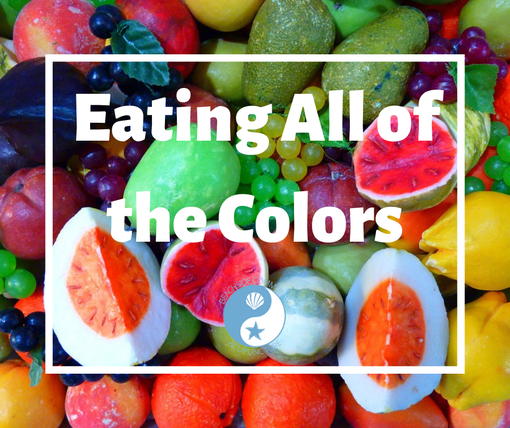
Maintaining a variety in one's diet usually requires intention, as many tend to eat the same things week after week. Actively choosing new and unusual foods is worth the effort, though, because studies show that a more diverse diet leads to a more diverse gut microbiome, making the digestive system more adaptable to stressors. One way to make sure that you're getting ample variety is by eating all of the colors.
Most people equate "eating the rainbow" with snacking on colorful candy, but it's a great philosophy to have when it comes to consuming produce. The hue of a fruit, vegetable, or legume can give an indication of its predominant phytonutrients, and while you may choose colors specifically to correct known deficiencies or imbalances you can also consume all of the colors - the entire rainbow - to ensure you're getting a solid foundation of all the vitamins, antioxidants, and other nutrients found in plants. Either way, it's helpful (and fun!) to know the benefits each food can provide your body. There are many phytonutrients contained in a piece of produce, but the following are some examples for each color group.
Red and Pink Produce
Fruits with a pink to red hue, such as tomatoes and watermelons, can contain an antioxidant called lycopene. In Traditional Chinese Medicine (TCM), red produce can also benefit Blood, making it useful for the pattern similar to anemia in Western medicine. Five Element Theory also ascribes the color red to the Heart system, which influences processes like circulation and sleep.
Orange and Yellow Produce
Carrots, papayas, and other produce orange to yellow in color can be high in lutein, an antioxidant that is best known for supporting eye health. Fruits and vegetables in this shade also influence the Spleen system, impacting everything from digestion to energy to rumination.
Green Produce
Cruciferous vegetables like kale and broccoli provide the body with isothiocyanates, antioxidants that may help prevent cancer. TCM believes green produce is tied to the Liver system, which dovetails with what Western medicine is finding about its influence on detoxification.
Blue and Purple Produce
Produce that is darker in color, such as blueberries, blackberries, and eggplant, is usually chock-full of anthocyanins. These antioxidants have been said to protect against everything from heart disease to Alzheimer's to cancer. Blue and purple hues are akin to the black that Five Element Theory relates to the Kidney system. This organ system is the foundation for the aging process (among other things), so it makes sense that these foods may prevent degenerative illnesses.
White Produce
Onions and garlic are excellent sources of allicin and quercetin. While these compounds have been shown to impact everything from cardiovascular to neurological health, what's most interesting is their effect on the immune system, aiding in protection from viruses like the common cold and in the regulation of allergies. In TCM, the concept of the immune system is under the umbrella of the Lung system, and white is its corresponding color, proving yet again that modern medicine validates the body connections that Chinese scholars made centuries ago.

While some of these compounds can be found as supplements, we always recommend starting with their food source. Vitamins and other phytonutrients usually exist as complexes within food, which means they're found with other substances that make them more easily absorbed by the body. Also, by eating the fruit or vegetable, you'll end up consuming more than just a single antioxidant. (For instance, green veggies like broccoli are also high in the lutein found in orange produce.) If you have to take a supplement, choose one that is food-based rather than synthetic so that you'll be as close to the original source as possible.

Kathleen Ketola is a Licensed Acupuncturist and the owner of Beachside Community Acupuncture. She loves providing affordable acupuncture to the residents of McKinney, Texas, and surrounding cities like Prosper, Frisco, and Plano, but she also enjoys educating the general public on how acupuncture and Traditional Chinese Medicine (TCM) can treat everything from pain to infertility to stress and beyond. Click "Book Now" at the top of this page to book an appointment or feel free to contact her at (214) 417-2260.









